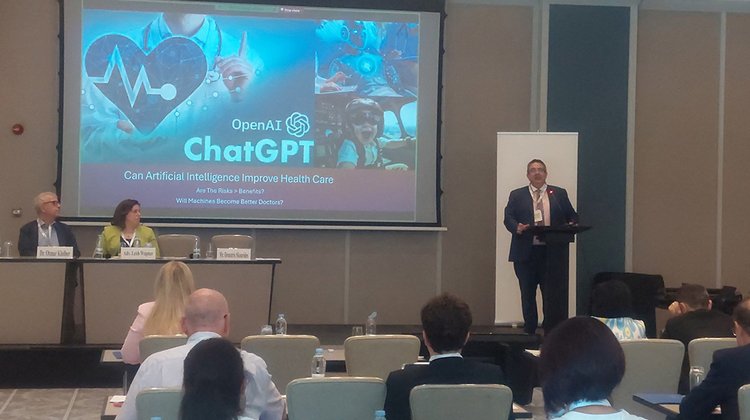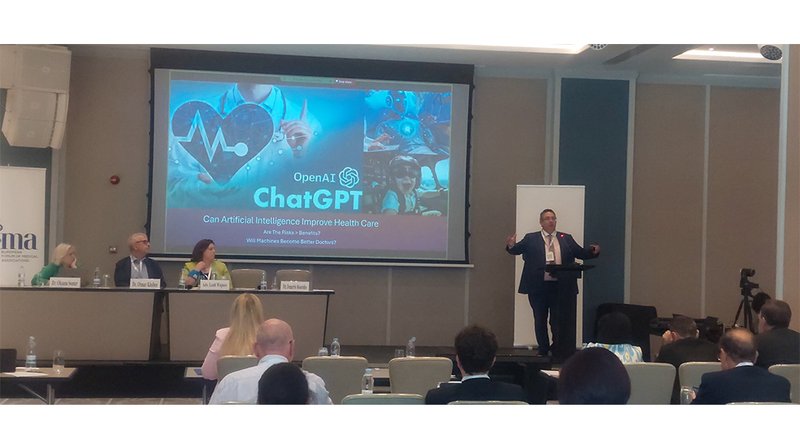AI in healthcare was at the centre of Chief Scientist’s keynote speech at EFMA
07:18 - 04 October 2024

The Chief Scientist for Research, Innovation and Technology of the Republic of Cyprus, Demetris Skourides, attended the 38th Annual Meeting of the European Forum for Medical Advancement (EFMA) in Limassol, Cyprus, in his capacity as Technology Officer and AI Strategist.
This year's event gathered leading experts, professionals, and stakeholders from the global medical community to discuss pressing challenges and explore innovative solutions.
The EFMA Annual Meeting is a highly anticipated event in the medical calendar, serving as a platform for the exchange of knowledge, ideas, and best practices among professionals dedicated to the advancement of medical science and healthcare. This year's theme, "Threats to the Medical Profession," underscores the urgency of addressing the multifaceted challenges that threaten the integrity, sustainability, and future of the medical field.
The 38th EFMA Annual Meeting addressed a variety of critical topics, including but not limited to:
- Discrimination within the Health Care system
- Threats to the independence of Medical Associations
- Physician Assistants: Risks to the Medical Profession
- Artificial Intelligence: Is it a help or a threat?
In his thought leadership keynote speech as part of the conference, Skourides shared insights on how Artificial intelligence and robotics will augment medical professionals in what he referred to as Human Centric Augmentation giving medical professionals AI superpowers. During his keynote, the Chief Scientist addressed the myth that ChatGPT has the answers to medical questions. As he explained, while generative Intelligence can address many use-cases in healthcare -particularly related to administration - a more sophisticated, large language model trained with medical data is required to unlock value in the medical field.
Skourides listed examples of AI in Surgery, Diagnosis, Prevention, and Treatment, and stressed that the introduction of Artificial intelligence in medicine will help medical providers, doctors, and physicians, to make informed decision making faster, reducing medical risks for patients and ultimately make healthcare more affordable for citizens.
Demetris Skourides further elaborated on the changing role of education, and by including AI in the medical school curriculum, medical professionals will be equipped with necessary tools to guard human life from various diseases. In addition, the Chief Scientist shared the progress Cyprus is making in healthcare research, indicating that the government has granted €41m in funding since 2016, of which €13.9m in Research, €7.5m in Knowledge Transfer, €9.5m in Innovation, €5.4m in Research Infrastructures, and €4.8m in Internationalization. Skourides also referred to the work of Dr Triantafyllos Stylianopoulos who received an ERC Advanced Grant, in “Overcoming Mechanically-Induced Resistance to Chemo-Immunotherapy in Pancreatic Cancer”(“MechanoResistance”) which aims to improve the treatment of pancreatic cancer.

Additionally, he shared examples of innovative companies undertaking healthcare-related research leveraging AI, including Cat brain, Agora 3.0, and CSPARK, emphasizing on the vision to deploy “organs-on-chip” on micro-cube-sats to study the impact of solar storms on humans in space. Furthermore, Skourides stressed the importance of patient health data and referred to 9 best practices that can help build confidence in Data ethics. He also expressed his confidence in managing the risks by leveraging technology and governance in compliance with regulations.
During his keynote speech, the Chief Scientist analysed the different uses of Generative AI in healthcare which can help reduce administrative and operational costs, and highlighted examples of how AI can create value for both medical professionals and patients. Skourides stressed that AI can provide the healthcare system with the ability to scale personalized healthcare at a lower cost, and shared real-life examples of how customer-centric healthcare solutions can help improve the quality of life.
Furthermore, he emphasised on the creation of value by highlighting the opportunity of connecting seamlessly smart devices, smart watches and integrating them with healthcare platforms that interface with EHR and digital twins creating real-time patient 360 healthcare systems. He cautioned the audience that while such solutions and use-cases are currently explored, companies and healthcare organizations must focus on building a team comprised of chief compliance, digital officer, data scientists and data engineers to ensure the integrity, security, and privacy, addressing regulative concerns and the reduction of bias.
During a panel discussion, chaired by Dr Otmar Kloiber, Secretary General of the World Medical Association, Adv. Leah Wapner, Secretary General of the European Forum of Medical Associations, Hadas Bitran, Head of Health & Life Sciences at Microsoft Israel R&D Centre, and Dr. Oksana Souter, CEO of Swiss Organic Solutions, Skourides answered questions on AI Ethics, Traceability, and assured the audience, that with the EU AI framework, AI implementations should not be perceived as a threat to medical professionals. “Medical doctors should view it as a co-pilot that can help reduce operational and information workloads, as well as life-threatening risks, improve decision making, and help doctors focus on what matters for their patients”.
In closing, Skourides referred to the concept of “Doctors, Physicians having new friends” indicating how the convergence of robotics with AI-powered medical language learning models will embed intelligence in robotic helpers for the elderly, nursing robots, next-generation AI-driven surgical robots, robotic surgery teams and AI chatbots interoperating with Digital Twin Health care platforms in line with DPA, HIPAA, GDPR and national requirements. In his view, AI will be fundamental in enabling medical professionals to help patients and expressed confidence that through the EU AI Act framework, government, healthcare industry, and society can manage the risks associated with ethics, and privacy. Now is the time to embark on the awareness journey and upskill to leverage AI.

